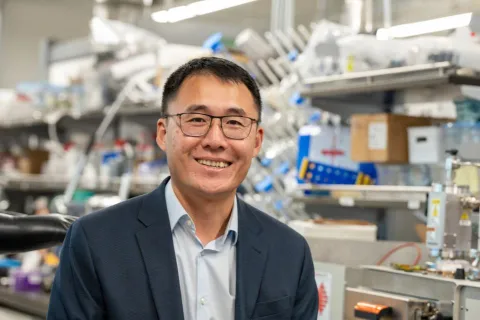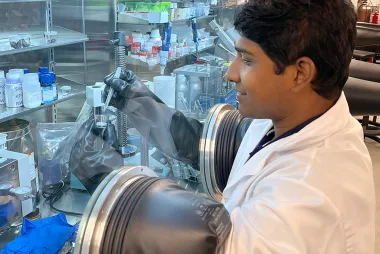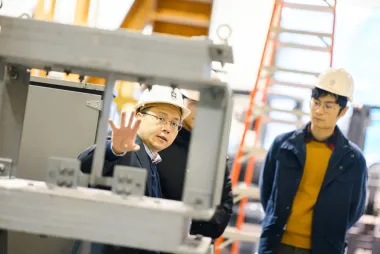School of Engineering professor to lead new Battery Innovation Centre at UBC Okanagan

From phones to computers and vehicles, the number of battery-powered devices that people depend on continues to increase, leading to the need to find more efficient and sustainable methods of battery production.
Now, a cutting-edge laboratory at UBC Okanagan will provide a world-class space for researchers, government and industry partners to work together to tackle this pressing need. Josie Osborne, BC’s Minister of Energy, Mines and Low Carbon Innovation, was at UBC Okanagan Monday to announce $2 million in funding for a new Battery Innovation Centre that will empower UBC researchers to advance battery innovation in the province.
"We are proud to support UBC Okanagan's Battery Innovation Centre, which will place British Columbia at the forefront of battery technology innovation and create more jobs for people through an inter-provincial circular economy,” said Osborne. “By advancing solid-state battery technology, we are not only investing in groundbreaking research but also contributing to a sustainable and low-carbon future."
Located in UBC Okanagan’s Innovation Precinct 1, the centre will be led by School of Engineering professor Dr. Jian Liu, who is already working with Canadian and international industry leaders to design, develop and create prototypes of the next generation of batteries.
“We are grateful to the BC government for this critical investment in next-generation battery technology,” said UBC Okanagan Principal and Deputy Vice-Chancellor Dr. Lesley Cormack. “Energy storage is the missing piece of the puzzle that will allow us to fully utilize clean, renewable energy. This investment will position UBC Okanagan and the region as a hub of battery innovation and allow Dr. Liu and our industry partners to continue to develop a stronger battery ecosystem and a circular battery economy.”
New Methods And Materials
Over the past seven years, Dr. Liu and fellow researchers have been working with many small and medium-sized businesses across Canada to improve the country’s battery supply chain.
“Many companies lack the ability to test and demonstrate their materials, and in Canada there is a lack of ability and infrastructure for battery prototyping. The new facility will help us fill this gap,” said Dr. Liu, who in addition to serving as an Associate Professor in Mechanical Engineering with the School of Engineering, also leads UBC Okanagan’s Battery Innovation Cluster and is the Principal’s Research Chair in Energy Storage Technologies.
Up until now, Dr. Liu and his team have been fixated on studying batteries at the atomic structural level, focusing primarily on testing innovative new materials in coin cell batteries like those used in watches and key fobs.
We are not only investing in groundbreaking research but also contributing to a sustainable and low-carbon future.
As Dr. Liu explains, the new centre will help researchers move to the next phase using new materials and innovations in pouch and cylindrical cells, such as those used in electric vehicles.
“The new centre will expand our capacity and allow us to apply the leaps we have made with materials at the atomic level into practice in these new and larger cells for a wider range of applications.”
When many people think of batteries, they think of the cells commonly found in households, which are fueled by traditional materials that have been in use for decades, like lithium.
Dr. Liu and his team are constantly exploring new materials and techniques that represent the next generation of energy storage systems, including combinations of zinc and alkali metals which he and fellow researchers have shown in a recent study to offer higher voltage, better stability and improved safety. This type of work will be further enhanced in the new research space.
Innovation Through Collaboration
The Battery Innovation Centre will provide an invaluable space for academic researchers to partner with Canadian industry leaders to test materials and accelerate battery development and deployment in Western Canada. Dr. Liu hopes it may one day serve as a national hub for the development of a stronger battery ecosystem.
“We want to ensure everyone is aware of this facility, across academia, industry and communities so that they understand the benefits it can bring. It will significantly boost the battery ecosystem in BC,” said Dr. Liu.
Energy storage is the missing piece of the puzzle that will allow us to fully utilize clean, renewable energy.
Fenix Advanced Materials, a clean technology company that specializes in the manufacture of ultra-high-purity metals, is an industry partner working with the researchers to test more efficient battery materials.
“We are thrilled to work with UBC Okanagan on battery research,” said Don Freschi, Fenix CEO. “The new centre is going to be a great benefit to our company and the entire battery industry in Western Canada. It’s going to allow us to continue to develop and commercialize our existing materials, and to explore new and emerging materials, giving us the potential to expand our market. This is a perfect example of UBC researchers and industry working together to innovate.”
Metal Tech Alley, based in Trail, is another. The economic development agency aims to advance the circular economy movement in BC by bringing together leaders across academia, industries and municipalities to make more environmentally and community-focused strides.
Dr. Liu’s research team has been working with Metal Tech Alley to develop new recycling methods to recover and repair graphite anode materials from end-of-life lithium-ion batteries and then place that recovered material into new batteries. He notes that by circling critical battery materials in the supply chain, it will reduce the dependence on mining and the related energy, environmental and ethical issues.



